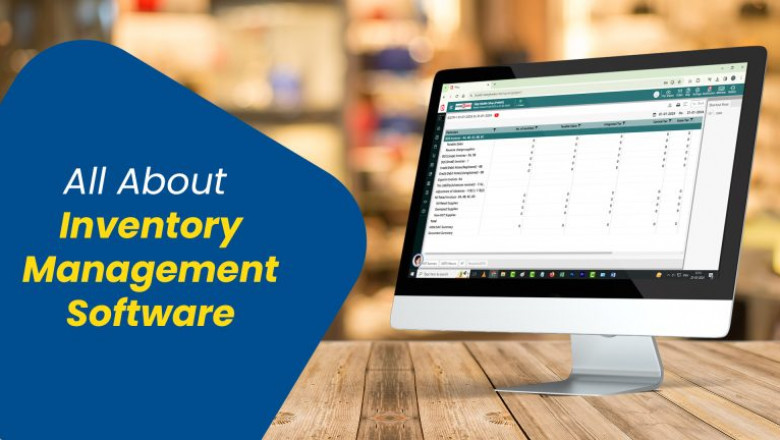views
How Inventory Management Software Boosts Small Business Efficiency
Introduction
Running a small business comes with unique challenges, and managing inventory effectively is one of the biggest. Inventory management directly impacts customer satisfaction, operational efficiency, and overall profitability. However, traditional methods of tracking inventory often result in stockouts, overstocking, or human errors that can cost businesses both time and money.
This is where inventory management software for small business plays a crucial role. By automating inventory tasks, providing real-time updates, and generating insightful analytics, inventory management tools help small businesses streamline their operations and focus on growth. In this blog, we’ll explore the benefits of inventory management software and discuss how to choose the best inventory management software for your needs.
Why Inventory Management Matters for Small Businesses
For small businesses, every sale and stock decision counts. Poor inventory management can lead to a range of problems, such as:
- Stockouts: Missing sales opportunities due to unavailable products.
- Overstocking: Tying up cash in excess stock that may not sell.
- Operational Inefficiency: Time-consuming manual processes that reduce productivity.
- Lack of Insights: Difficulty in analyzing which products perform well and which don’t.
Efficient inventory management ensures that businesses always have the right products in the right quantities at the right time, improving customer satisfaction and reducing costs.
What is Inventory Management Software?
Inventory management software is a tool that helps businesses monitor, control, and optimize their stock levels. Designed for small businesses, this software automates processes like tracking stock, managing orders, and forecasting demand, freeing up valuable time for business owners.
Key Features of Inventory Management Software
- Real-Time Stock Tracking: Get instant updates on stock levels across multiple locations.
- Low-Stock Alerts: Receive notifications when stock levels reach a predefined threshold.
- Barcode and RFID Integration: Simplify inventory tracking with scanning tools.
- Demand Forecasting: Use historical data to predict future inventory needs.
- Multi-Channel Integration: Sync inventory across online and offline sales platforms.
- Reporting and Analytics: Generate detailed reports on inventory turnover, sales trends, and product performance.
Benefits of Inventory Management Software for Small Businesses
1. Prevents Stockouts and Overstocking
One of the primary benefits of inventory management software for small business is its ability to prevent both stockouts and overstocking. With real-time tracking and automated reordering, businesses can ensure they always have the optimal amount of stock.
2. Saves Time and Reduces Errors
Manual inventory management is time-consuming and prone to errors. Inventory software automates repetitive tasks, such as updating stock levels and generating purchase orders, reducing human errors and saving valuable time.
3. Improves Customer Satisfaction
Nothing frustrates a customer more than finding out that their desired product is out of stock. By ensuring that inventory levels are always up-to-date, inventory management software helps businesses deliver a better customer experience.
4. Enhances Decision-Making with Analytics
With access to detailed reports and analytics, small businesses can identify trends, forecast demand, and make data-driven decisions about inventory and purchasing strategies.
5. Reduces Costs
By optimizing stock levels, inventory management software minimizes storage costs and prevents losses due to unsold inventory. It also reduces the risk of over-ordering, freeing up capital for other business needs.
6. Integrates with Other Tools
Many inventory management tools integrate seamlessly with accounting, sales, and CRM software, providing a unified view of your business operations and improving overall efficiency.
Choosing the Best Inventory Management Software
When selecting the best inventory management software for your small business, consider the following factors:
1. Ease of Use
Small businesses often don’t have the resources for extensive training. Choose software with an intuitive interface that your team can start using immediately.
2. Scalability
As your business grows, your inventory needs will evolve. Opt for software that can scale with your business, handling more products, locations, and sales channels as required.
3. Integration Capabilities
Ensure the software integrates with your existing systems, such as e-commerce platforms, accounting software, and point-of-sale systems, for seamless operations.
4. Cost-Effectiveness
Small businesses often operate on tight budgets. Look for software that offers the features you need at a price you can afford, with no hidden costs.
5. Support and Maintenance
Reliable customer support and regular software updates are crucial for maintaining smooth operations. Choose a provider known for excellent post-purchase support.
Best Practices for Using Inventory Management Software
1. Set Minimum Stock Levels
Establish minimum thresholds for each product and configure low-stock alerts to avoid running out of essential items.
2. Track Product Performance
Use the software’s analytics tools to identify your best- and worst-performing products. This data can help you make informed decisions about which items to stock more of or discontinue.
3. Regularly Audit Inventory
While inventory management software automates many processes, periodic manual audits can help ensure data accuracy and catch any discrepancies.
4. Leverage Multi-Channel Syncing
If you sell across multiple channels, such as an e-commerce store and a physical location, ensure your software syncs inventory data across all platforms to prevent stock discrepancies.
The Role of Inventory Management in Business Growth
Efficient inventory management isn’t just about reducing errors or saving time—it’s a growth enabler. By optimizing inventory levels, businesses can:
- Free up capital for marketing, hiring, or expanding operations.
- Improve operational efficiency, allowing teams to focus on strategic tasks.
- Deliver a superior customer experience, driving repeat business and loyalty.
Conclusion
For small businesses, adopting inventory management software is no longer optional—it’s a necessity. By automating inventory tasks, reducing errors, and providing actionable insights, this software helps businesses stay competitive in today’s fast-paced market.
If you’re looking for a solution tailored to your unique needs, choosing the best inventory management software can make all the difference. With the right tool in place, your business can optimize stock management, improve customer satisfaction, and unlock new opportunities for growth.






















Comments
0 comment